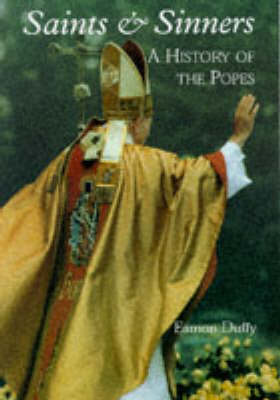Yale Nota Bene
1 total work
This text encompasses the history of the papacy, from its beginnings nearly 2000 years ago to the reign of Pope John Paul II. It is a book that should interest anyone wishing to understand the history of the Catholic church, as well as anyone with an interest in the ideological, political, and cultural forces that have shaped the modern world. Eamon Duffy traces the process by which Peter, the humble fisherman of Galilee, became the figurehead and basis for an institution that outlived not only the Roman and Byzantine empires but also those of Carolingian Gaul, medieval Germany, Spain, Britain, the Third Reich of Hitler and most recently the Soviet Union. Today, 700 million people look to the Pope for spiritual leadership and the Papacy has become the oldest and perhaps most influential of human institutions. Duffy begins by exploring the origin of the Papacy and the development of papal authority in the centuries after Roman Emperor Nero's execution of the Apostle Peter.
He describes the role of the Papacy in political as well as religious spheres after the collapse of the Roman Empire; the contradictory period of the Middle Ages, when popes launched the Crusades and established the Inquisition even as they adopted exalted spiritual reforms; and the notorious popes of renaissance Rome whose support of Leonardo, Raphael and Michelangelo yielded religious masterpieces, but whose worldly habits helped bring about the Reformation and the split of western christendom. The author shows how popes have faced the multiple challenges of the modern world since the French Revolution and how they continue to influence such contemporary issues as the morality of the death penalty, of abortion, of capitalism and of nuclear war.
He describes the role of the Papacy in political as well as religious spheres after the collapse of the Roman Empire; the contradictory period of the Middle Ages, when popes launched the Crusades and established the Inquisition even as they adopted exalted spiritual reforms; and the notorious popes of renaissance Rome whose support of Leonardo, Raphael and Michelangelo yielded religious masterpieces, but whose worldly habits helped bring about the Reformation and the split of western christendom. The author shows how popes have faced the multiple challenges of the modern world since the French Revolution and how they continue to influence such contemporary issues as the morality of the death penalty, of abortion, of capitalism and of nuclear war.
